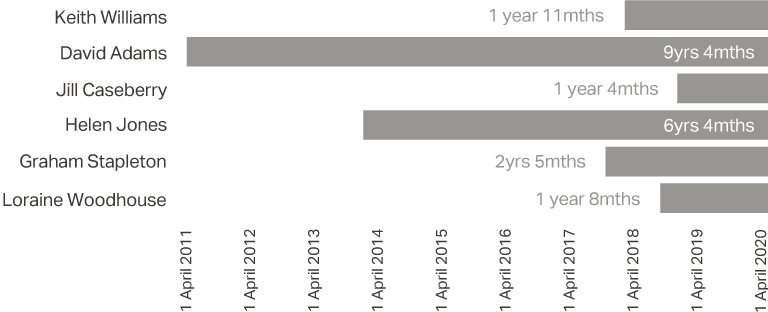Board Composition
As at the date of this report, the Board of Directors comprised six members, namely the Non-Executive Chairman, three other Non-Executive Directors and two Executive Directors. The composition of the Board is set out in the Directors' Report and the biographies of each Director, including any other business commitments, are available in the Board of Directors. The Board believes that it has an appropriate balance of Executive and independent Non-Executive Directors, having regard to the size and nature of the business. The Board also believes it has an appropriate balance of skills and experience. Further details are available in the Corporate Governance Report.
In May 2020, Keith Williams became interim Executive Chair of Royal Mail Group.
Board changes
David Adams will have been in office for nine years this year, and so in accordance with the Code and best practice, David is due to stand down. The search for a new Non-Executive Director to replace David commenced at the start of the year, but the search has taken longer than expected due to the impact of the COVID-19 pandemic in the spring of 2020. Given the difficulties created by the global pandemic, the Nomination Committee agreed to extend David's term of appointment until December 2020. It is expected that a new Non-Executive Director will be appointed in the autumn / winter of 2020 which will allow an orderly handover. In addition, it has been agreed that David will step down as Senior Independent Director at the conclusion of the AGM on Tuesday 15 September 2020 and Helen Jones will be appointed in his place.
Board Independence
The Non-Executive Directors bring wide and varied experience to the Board and its Committees. The Code recommends that at least half of the Board of Directors, excluding the Chairman, should comprise Non-Executive Directors, who are determined by the Board to be independent and are free from relationships or circumstances which may affect or could appear to affect the Non-Executive Director's judgement. Following a rigorous review, the Board considers Helen Jones and Jill Caseberry to be independent in character and judgement. However, due to the length of David Adams' tenure, the Board has assessed that he is no longer regarded as independent for the purposes of the Code. David has agreed to stay on until the end of 2020 to ensure continuity for the Board through the COVID-19 pandemic crisis. Whilst this has created a technical breach of the Code's recommendation that the majority of the Board be independent Non-Executive Directors, the Board believes that this short-term situation is justified in these current circumstances. Although David continues to act as a Non-Executive Director and Chair of the Audit Committee, he will cease to act as Senior Independent Director and this role with be fulfilled by Helen Jones with effect from the date of the AGM on Tuesday 15 September 2020. The Chairman, Keith Williams was considered independent upon his appointment.
Re-election
In compliance with the Code and the Company's Articles of Association, all of the Directors on the Board as at 6 July 2020, will seek re-election at the 2020 Annual General Meeting ("AGM"), these being: Keith Williams, Helen Jones, David Adams, Jill Caseberry, Graham Stapleton and Loraine Woodhouse.
Board Responsibilities
The Board is responsible for the long-term success of the Company and is committed to ensuring that it provides leadership to the business as a whole, having regard to the interests and views of its shareholders and other stakeholders. It is also responsible for setting the Group's strategy, values and standards. Details of the Group's business model and strategy can be found in Our Strategy.
Division of Responsibilities
The roles of Chairman and Chief Executive Officer are separate and clearly defined, with the division of responsibilities set out in writing and agreed by the Board.
The Chairman is responsible for effective leadership, operation and governance of the Board and its Committees. He ensures effective communication with shareholders, facilitates the contribution of the Non-Executive Directors and ensures constructive relations between Executive and Non-Executive Directors.
The Chief Executive Officer is responsible for the management of the Group's business and for implementing the Group's strategy.
The Directors, together, act in the best interests of the Company via the Board and its Committees, devoting sufficient time and consideration as necessary to fulfil their duties. Each Director brings different skills, experience and knowledge to the Company, with the Non-Executive Directors additionally bringing independent thought and judgement. This combination seeks to ensure that no individual or group unduly restricts or controls decision-making.
A formal schedule of matters reserved for the Board is in place and regularly reviewed.
To discharge these responsibilities effectively, the Board has a system of delegated authorities, which enables the effective day-to-day operation of the business and ensures that significant matters are brought to the attention of management and the Board as appropriate. It is through this system that the Board is able to provide oversight and direction to the Executive Directors, the Executive Team and the wider business.
Matters specifically reserved for the Board include: strategy and management; corporate structure and capital; investor relations; audit, financial reporting and controls; nominations to the Board; executive remuneration and certain material contracts.
This is available at www.halfordscompany.com
Director Tenure and Board Succession
Succession planning for the Board is monitored regularly and in particular is considered in detail during the annual evaluation of the Board performance as described above. A new Non-Executive Director will be appointed towards the end of 2020 to replace David Adams, who has come to the end of his tenure, as described above. Details of the tenure for all Board members can be found in the Corporate Governance Report.
The Board – Key Responsibilities
- The Board is collectively responsible for the long-term success of the Company, with due regard to the views of shareholders and other stakeholders. It provides leadership and direction on the Company's culture, values and purpose; sets the strategic direction; agrees the risk framework and ensures these are managed effectively. The Board is accountable to shareholders for the financial and operational performance of the Group.
- See the Corporate Governance Report for examples of the Matters Reserved for the Board. A complete list of these matters is available on the Company's website www.halfordscompany.com
Key Responsibilities:
- responsible for the day-to-day management of the Company;
- develops the Group's objectives and strategy for Board approval;
- creates and recommends to the Board an annual budget and financial plan;
- delivers the annual budget and plan and executes the agreed Group strategy and other objectives;
- identifies and executes new business opportunities and potential acquisitions or disposals;
- keeps the Chairman informed on all important matters; and
- manages the Group's risks in line with the Board-approved risk profile.
Senior Independent Director
Key Responsibilities:
- provides a sounding board for the Chairman;
- holds meetings with the other Non-Executive Directors without the Chairman at least once a year to appraise the Chairman's performance;
- acts as an intermediary for the other Directors; and
- is available to other Directors and shareholders in order to address concerns that cannot be raised through the normal channels.
Key Responsibilities:
- evaluate and appraise the performance of Executive Directors and Senior Management against agreed targets;
- participate in the development of the Group's strategy;
- monitor the financial information, risk management and controls processes of the Group to make sure that they are sufficiently robust;
- meet regularly with senior management;
- periodically visit Group sites, stores and Distribution Centres;
- meet together without the Executive Directors present;
- participate in a training programme, including store visits and updates from management; and
- formulate Executive Director remuneration and succession planning.
Key Responsibilities:
- works closely with the Chairman, Group Chief Executive Officer and Board Committee Chairs in setting the rolling calendar of agenda items for the meetings of the Board and its Committees;
- ensures accurate, timely and appropriate information flows within the Board, the Committees and between the Directors and Senior Management; and
- provides advice on Board matters, legal and regulatory issues, corporate governance, Listing Rules compliance and best practice.


Key Objectives:
To ensure that the Board has the balanced skills, knowledge and experience to be effective in discharging its responsibilities and to have oversight of all governance matters.
Main Responsibilities
The Nomination Committee's responsibilities include:
- making appropriate recommendations to maintain the balance of skills and experience of the Board by:
- considering the size, structure and composition of the Board;
- considering Senior Management succession plans; and
- identifying and making recommendations to the Board on potential Board candidates.
More information on Diversity in the Group can be found in the Corporate Governance Report.
Read more within the Nomination CommitteeReport.
Key Objectives:
To provide effective governance over the Group's financial reporting processes. This includes the internal audit function and external Auditor. The Committee maintains oversight of the Group's systems of internal controls and risk management activities.
Main Responsibilities
The Audit Committee's responsibilities include:
- making recommendations to the Board on the appointment/removal of the external Auditor, and their terms of engagement and fees;
- reviewing and monitoring the integrity of the Company's financial statements, including its annual and interim reports and preliminary results announcements and any other formal announcement relating to its financial performance, and recommending the same to the Board;
- assisting the Board in achieving its obligations under the Code in areas of risk management and internal control; and
- focusing on compliance with legal requirements, whistleblowing, accounting standards and the Listing Rules.
Read more within the Audit Committee Report.
Key Objectives:
To ensure that a Board policy exists for the remuneration of the Chief Executive Officer, the Chairman, Non-Executive Directors, other Executive Directors and members of the executive management.
Main Responsibilities
The Remuneration Committee's responsibilities include:
- recommending to the Board the total individual remuneration package of Executive Directors and members of the executive management;
- approving senior executive remuneration and oversight of remuneration matters generally;
- recommending the design of the Company's share incentive plans to the Board, approving any awards to Executive Directors and other executive managers under those plans and defining any performance conditions attached to those awards;
- determining the Chairman's fee, following a proposal from the Chief Executive Officer; and
- maintaining an active dialogue with institutional investors and shareholder representatives.
Read more within the Remuneration CommitteeReport.
Members:
David Adams
Jill Caseberry
Helen Jones
Members:
Jill Caseberry
Helen Jones
Members:
Keith Williams
David Adams
Helen Jones
The Nomination, Audit and Remuneration Committees' full Terms of Reference are available on the Company's website at www.halfordscompany.com or on request from the Company Secretary.